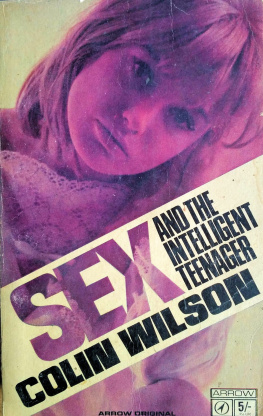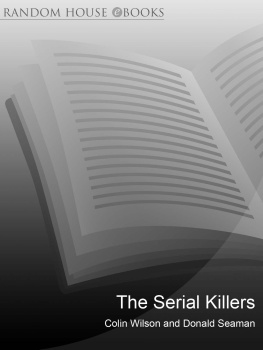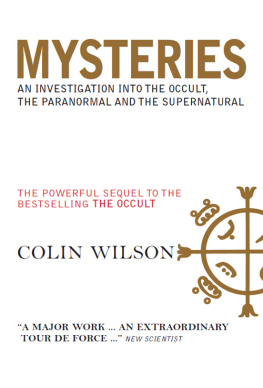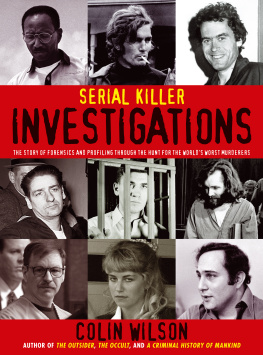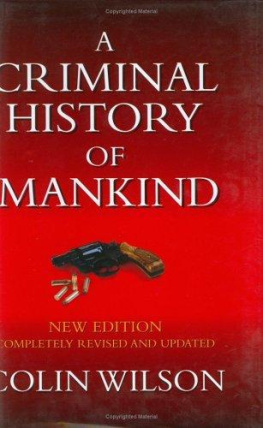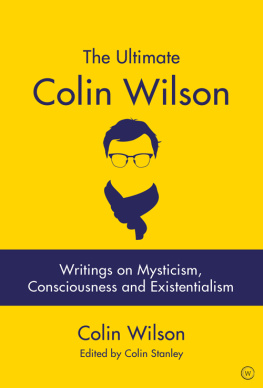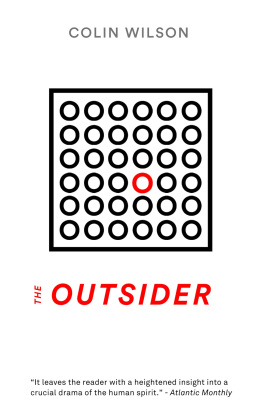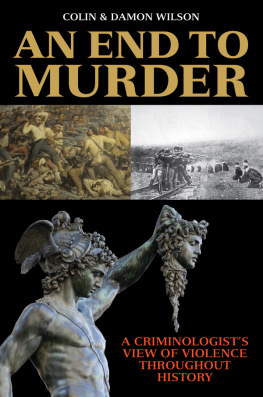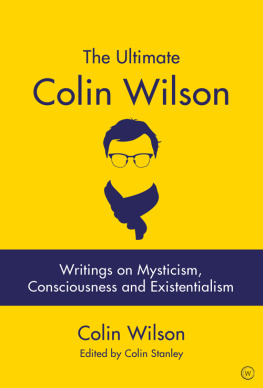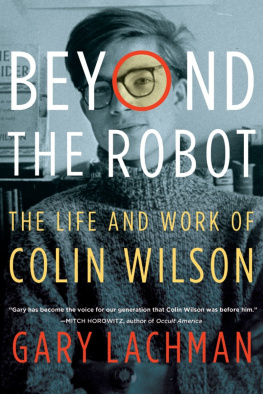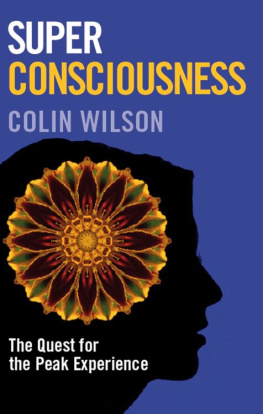Colin Wilson - Sex and the Intelligent Teenager
Here you can read online Colin Wilson - Sex and the Intelligent Teenager full text of the book (entire story) in english for free. Download pdf and epub, get meaning, cover and reviews about this ebook. year: 1966, publisher: Paupers Press, genre: Romance novel. Description of the work, (preface) as well as reviews are available. Best literature library LitArk.com created for fans of good reading and offers a wide selection of genres:
Romance novel
Science fiction
Adventure
Detective
Science
History
Home and family
Prose
Art
Politics
Computer
Non-fiction
Religion
Business
Children
Humor
Choose a favorite category and find really read worthwhile books. Enjoy immersion in the world of imagination, feel the emotions of the characters or learn something new for yourself, make an fascinating discovery.
- Book:Sex and the Intelligent Teenager
- Author:
- Publisher:Paupers Press
- Genre:
- Year:1966
- Rating:4 / 5
- Favourites:Add to favourites
- Your mark:
- 80
- 1
- 2
- 3
- 4
- 5
Sex and the Intelligent Teenager: summary, description and annotation
We offer to read an annotation, description, summary or preface (depends on what the author of the book "Sex and the Intelligent Teenager" wrote himself). If you haven't found the necessary information about the book — write in the comments, we will try to find it.
Sex and the Intelligent Teenager — read online for free the complete book (whole text) full work
Below is the text of the book, divided by pages. System saving the place of the last page read, allows you to conveniently read the book "Sex and the Intelligent Teenager" online for free, without having to search again every time where you left off. Put a bookmark, and you can go to the page where you finished reading at any time.
Font size:
Interval:
Bookmark:

Born: Leicester, 1931.
Internationally acclaimed philosopher, novelist, literary critic, playwright, criminologist. His first book: The Outsider, an instant bestseller in 1956, launched him on a remarkable career as a full time writer which has yielded well over 100 titles including eight Paupers essays.
Sex and the Intelligent Teenager, first published in 1966, has become one of the rarest of these titles, much sought by collectors and scholars around the world.
PAUPERS PRESS.
Copyright 1966 Colin Wilson
Introduction Copyright 1996 Colin Wilson.
Published by:
Paupers Press,
27 Melbourne Road,
West Bridgford,
Nottingham NG2 5DJ
England.
All rights reserved. No part of this publication may be reproduced, stored in a retrieval system or transmitted, in any form or by any means, electronic, mechanical, photocopying, recording, or otherwise, without the prior permission of the copyright holder.
First published in 1966 by Arrow Books Ltd
I.S.B.N. 0-946650-60-8 (Paperback)
I began writing this book thirty years ago, in 1965, because I wanted to express the ideas of an earlier book, Origins of the Sexual Impulse, in a simple form that would be accessible to the generation I hoped would be my future readers. This was the period of the Beatles and the pill and the miniskirt, and the young seemed to feel that they had just discovered sex. Pretty teenagers danced until the early hours of the morning, then went back to somebodys pad with a boy theyd only just met and slept together.
Of course, there had been discos in the 1950s where you could rock around the clock to the sounds of Elvis Presley and Bill Haley, but then it was somehow all much more innocent. To begin with, the girls wore long skirts that, even in the wildest gyrations, seldom rose far above the knee. Now the miniskirt and the pill combined to make teenage sex the norm. In a 1980s television documentary about the pill, one girl described how it had created a new sense of intimacy and freedom between the sexes. She and a total stranger had fallen into conversation in the tube, decided they liked one another, and returned to her room for sex, after which, they simply said goodbye. It was nice, she said. They both enjoyed it, and there were no strings attached.
She spoke of her sense of excitement at this new world in which you could enjoy sex as casually as the teenagers of my day (the forties) enjoyed kissing and cuddling in the back row of the cinema. It seemed that all the old inhibitions had gone for good. In the past, boys and girls had been attracted to one another, but if you had been well brought up, you went through all the formalities, and the sex, when it came, was supposed to be a possible step towards marriage. Now, if you liked a boy and he liked you, you tried it out, and if you decided he wasnt really your type, you went and tried it with somebody else.
Even I saw a little of this new world. In 1957, when I moved to Cornwall with my girlfriend Joy, we were still in our mid-twenties. In the Mevagissey pubs, we met a crowd of young fishermen who made a habit of going to dances solely with the intention of getting into fights. The police probably thought of them as young hooligans, but to us they seemed oddly innocent. They often came back to our house to drink and listen to records until two in the morning, and on a few occasions we even joined them in a local dancehall. (They never fought therethey reserved their high spirits for places where they met rivals from other villages.) None seemed to have regular girlfriends, and their affairs with girls they picked up on Saturday night never seemed to last more than a week or so.
They knew I wrote intellectual books, (it struck them as a marvellously lazy way of making a living), and often asked me to explain what I wrote about. Although it was necessary to avoid abstract language, I never had to talk down to them, and in our discussions they showed the same level of intelligence that I would expect among a group of university students.
Then, within what seemed an astonishingly short time, they were all married, and settled in council houses with a growing family. And I realised that, in a sense, the most interesting part of their lives was over. In ten years or so they would look very like their fathers, and return home for tea at six oclock in the evening, then settle down to watch television, or go for a pint and a game of darts in the Fountain, and grow old so imperceptibly that no one would notice ... Housman would have made it all sound rather tragic, but looking at them without sentimentality, I could see that they were at least better off than their great grandfathers.
One day when I happened to pass a bench in the park that had seen more couplings than most boudoir couches, I found myself thinking again about Nipper and Perrin and Kevin and Ralph, and remembering the days when their sole ambition was to hammer the lads from Bugle and deflower every virgin within a fifty mile radius. They obviously felt that sex offered what is now called a window of opportunity, a window that opened out on to a world where anything could happen. And I remembered an American friend in Strasbourg remarking how wonderful it was to realise, in his second year at college, that girls werent distant and untouchable, but that they were as curious about sex as men, and were perfectly willing to experiment. Then the window closes, and the sense of wonder is eclipsed by the light of common day and the problems of bringing up a family ...
What struck me in 1965 was that this new generation, like my American friend, thought that they had discovered something new and incredible, something that had been overlooked by all previous generations, with their old-fashioned moral and religious ideas. Men found girls attractive; girls found men attractive. The opposite sex could make you dream, could make you feel that the world was full of magic. The older generation warned that this magic could be dangerouscould leave you with unwanted pregnancies or sexual diseases. But even before the pill came along, there were such things as condoms and female contraceptives. Now everyone had grown up, we could stop worrying about these bugbears. The musical Hair proclaimed Masturbation can be fun. Dont be afraid of the magic carpetclamber on board and let it carry you off to the Emerald City of Oz ...
They were unaware that it had already been tried. In the 19th century, an extraordinary American religious prophet named John Humphrey Noyes came to the conclusion that the Second Coming had arrived around the year 70 AD, and that in this new era, there should be neither marriage nor giving in marriage. In his Oneida Community, every man was every womans husband, and every woman was every mans wife. Unwanted pregnancies were avoided by a system he called Male Continence, which meant that the male introduced his penis into his partners vagina, then simply lay there and savoured the pleasure; when he felt orgasm was beginning to approach, he withdrew. Apparently the members of the community found this far more satisfying than straightforward sex, for it introduced an element of disciplined anticipation, which kept habit at bay.
The Oneida Community was finally driven out of existence by the outrageand no doubt envyof its neighbours. But in the 20th. century, the idea of total sexual freedom was revived by a German called Otto Gross, who preached that Pleasure is the only source of value. Noyes had preached sexual freedom in the name of religion, but Gross preached it for its own sake. Two of his most ardent followers were the von Richthofen sisters, who also became his mistresses; one of these, Frieda, married D.H. Lawrence, and practised Grosss teaching by being unfaithful to him on their honeymoon. On another occasion, after a quarrel with Lawrence, she swam naked across a river, and gave herself to a brawny woodcutter she encountered on the other side.
Next pageFont size:
Interval:
Bookmark:
Similar books «Sex and the Intelligent Teenager»
Look at similar books to Sex and the Intelligent Teenager. We have selected literature similar in name and meaning in the hope of providing readers with more options to find new, interesting, not yet read works.
Discussion, reviews of the book Sex and the Intelligent Teenager and just readers' own opinions. Leave your comments, write what you think about the work, its meaning or the main characters. Specify what exactly you liked and what you didn't like, and why you think so.

